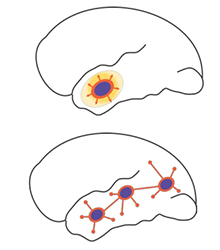
In a new paper published in the prestigious journal Brain, Dr. Theodore Schwartz and his lab team, in partnership with Dr. Catherine Schevon of Columbia University, describe laboratory findings that could have important implications for epilepsy in humans. The paper, “Role of inhibitory control in modulating focal seizure spread,” explains an observation that has long confounded epilepsy researchers: the distance between a seizure’s focus, where it originates and where intense activity can be observed, and the outer limits of its penumbra, where abnormal activity can still be observed even though neurons are not involved in the seizure.
Focal seizures (those that originate in a small, specific area of the brain) are known to spread to contiguous areas relatively slowly, at less than 1 millimeter per second, as each affected area “recruits” an adjoining region. Yet even when intense seizure activity is limited to a small area, epileptiform discharges can be observed on EEGs far from the focal point. Researchers theorize that a large-scale network effect is at work, with widespread circuitry expanding the area where seizure activity can be observed. But why some patients have such widespread seizures has not previously been understood.
In this study, researchers examined the balance between excitatory and inhibitory forces – the former encourages a seizure to spread, and the latter restrains it. In this study, researchers who suppressed the inhibitors observed that a seizure would then propagate to far distant sites in the brain. Widespread seizures, then, may be caused by a defect in the brain’s ability to inhibit propagation. As the researchers conclude, “compromised local inhibitory response, depending on its distance from the ictal core, can result in various seizure propagation patterns and epileptic network formation…. Further studies to provide direct evidence of this process in humans will help to establish its potential role in informing clinical management and development of new treatments.”
In addition to Dr. Schwartz and Dr. Schevon, the paper’s authors include Hongtao Ma, Mingrui Zhao, Eliza Baird-Daniel, Andy Daniel, and Ronald Emerson of Weill Cornell Medicine, and Jyun-you Liou, Michael Wenzel, Elliot H Smith, and Rafael Yuste of Columbia University. Read the abstract